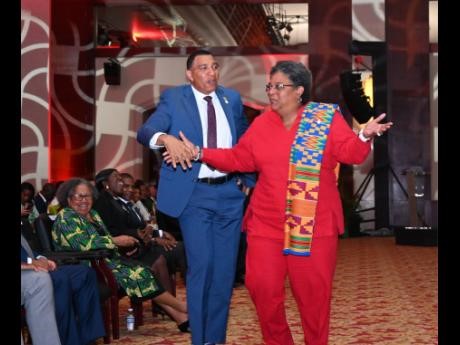By Prime Minister Mia Staff Editor
(Jamaica Gleaner) Prime Minister Dr Andrew Holness has declared that dismantling criminal gangs across the Caribbean must be treated with the urgency of the global war on terror.
Holness warned that organised violence now poses a public health threat regionwide.
Delivering a commanding address as incoming chair of CARICOM at the 49th Conference of Heads of Government at the Montego Bay Convention Centre on Sunday, Holness called for transformative action on a range of critical issues, from climate justice and security to youth empowerment and regional integration, urging his colleagues to “cross the rivers” of shared challenges together.
“There can be no sustained prosperity without security,” Holness asserted, referencing a 2024 UNODC report that spotlighted escalating gang activity in Jamaica, St Lucia, Guyana, and Trinidad and Tobago. “We need to launch a war on gangs of a similar magnitude and nature to the war on terror.”
He emphasised that while the roots of gang violence may lie in poverty, broken homes, and social alienation, the modern manifestation is far more sinister, driven by transnational profit, organized intelligence, and firearm access.
“This is no longer about street-level dispossession,” he warned. “It is the organisation of violence for profit, and our policy and jurisprudence must evolve to address it.”
Holness underscored that this crisis should be treated as both a national security threat and a public health emergency, noting that in Jamaica, 90 per cent of those involved in homicides, both perpetrators and victims are male.
On Haiti, the prime minister reaffirmed Jamaica’s unwavering commitment to supporting the embattled nation, insisting that CARICOM must “redouble its efforts” to rally international support for the deployment of a multinational force and long-term development.
“We cannot be true to our CARICOM principles if we leave our brothers and sisters in Haiti at the mercy of gangs,” Holness declared. “The appetite to support Haiti has slowed. We must reignite it.”
He pledged that, as CARICOM chair, the regional security strategy and support for Haiti would remain a top priority.
Switching gears to the climate crisis, Holness delivered a powerful plea for climate justice, describing the issue as “not an academic discourse” for small island states, but a lived and urgent threat.
“Last year, Jamaica was hit by one of the fastest-forming Category-4 hurricanes in our history,” he recalled. “A similar weather event in the US may have limited fiscal impact, but for us, it’s economically catastrophic.”
He stressed the need for greater access to climate finance, pushing for the fulfilment of promises made under the Paris Agreement, and said Jamaica would continue to lead advocacy efforts globally.
Holness also challenged CARICOM to deepen regional trade, agriculture, and youth inclusion, identifying people, partnerships, and prosperity as the pillars for progress.
“We’ve left too many gains on the table,” he said. “Guyana has land and energy. Suriname and Trinidad too. Jamaica has unmatched human capital. The resources are here – we must now get it, because we really want it.”
He further addressed the preservation of Caribbean identity in the digital age, echoing concerns raised by Prime Minister Mia Mottley about the cultural erosion being caused by unchecked digital consumption among youth.
“This is not a call to censor,” Holness said. “But if we’re not careful, our Caribbean civilisation could evaporate.”
As the conference proceeds this week, Holness said critical attention will also be given to COP30 preparations, the integration of CARICOM’s single market, and external trade negotiations, particularly with Africa and other global south partners.
Concluding his speech, the prime minister issued a rallying call.
“We must be bold enough, strategic enough, and disciplined enough to turn dreams into reality. Yes, there are rivers to cross, but we will get there. Because we really want it.”
In her opening address, CARICOM Secretary-General Dr Carla Barnett reinforced the gravity of the issues raised by Holness. She described the escalating crisis in Haiti as a humanitarian and security emergency that demands unwavering regional solidarity.
“We cannot turn away from Haiti,” she stressed. “Our credibility as a community rests in how we respond to our most vulnerable member state.”
Barnett also highlighted the growing threat of organised crime and the corrosive impact it is having on governance and development. “These are not isolated problems. Transnational crime, violence, and gang activity are bleeding across borders. We must act collectively to dismantle these networks that are undermining our democracies,” she said.
She further echoed the prime minister’s call for climate justice, warning that the Caribbean cannot wait on global systems to catch up.
